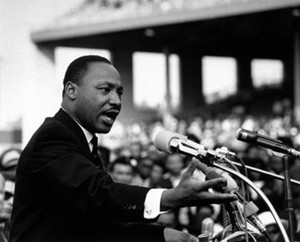(单词翻译:单击)

INTRO: February is African American History Month in the United States. It's a good opportunity for our Wordmasters, Avi Arditti and Rosanne Skirble, to look at the history — and structure — of a style of English used by black Americans.
MUSIC — "Rappers Delight"/Sugar Hill Gang
AA: I'm Avi Arditti. It was 1979 when the Sugar Hill Gang, a trio from Harlem, New York, changed music history with this song, "Rappers Delight."
RS: I'm Rosanne Skirble. "Rappers Delight" was the first commercially successful rap song in America. Since then, rap music has been helping to bring African American dialect into mainstream culture.
Linguists today call it African American vernacular English.
AA: John Baugh is a professor of education and linguistics at Stanford University in California. His research focuses on the history, politics and race issues related to the speech used in the United States by the descendants of slaves. Professor baugh says that, unlike other immigrant languages, no African language survived the Atlantic crossing to America.
TAPE: CUT ONE — JOHN BAUGH
"The reason for that was that slave traders separated slaves by language to restrict their communication, and when you compound that slaves were denied access to schools by law when they first came to the south, that unique linguistic history combined with the lack of access to the model of standard English that was needed in the majority culture, has triggered all the linguistic features which we can now talk about."
RS: John Baugh of Stanford University says that — contrary to stereotypes — when African Americans use non-standard English, they follow a structured dialect with a definite set of rules.
TAPE: CUT TWO — JOHN BAUGH
"Let me give you an example with the use of the word 'is.' In standard English you would either say 'he is coming' or 'he's coming.' In African American English it's quite common to say 'he coming.' It turns out many of the languages in the world function in this way, Russian being one. But there's a striking difference to the ear of the listener as to whether or not someone says 'he coming' or 'he happy' versus 'he's coming or 'he's happy.' If you conclude that the missing 'is' is substantial, we find that in the African American case the present tense form can be unmarked. So they will say 'he will be happy' or 'I was happy,' but 'I happy' or 'he happy' in the present tense doesn't have to be marked, whereas in standard English it must be marked."
AA: Despite the rules that govern African American Vernacular English, John Baugh says considerable prejudice remains. He says teachers should support linguistic and cultural diversity in the classroom.
TAPE: CUT THREE — JOHN BAUGH
"When I attended inner-city schools in Philadelphia and Los Angeles, that was not the case. It was very clear that many of my teachers held our dialect in low regard and would say things like 'people who speak that way can't be intelligent' and so on and so forth. It's very difficult for a young child in that circumstance if people aren't sensitive to the fact that everyone wants to respect their culture, their background, and what their people have contributed to the development of this country."
RS: We'll hear more from John Baugh of Stanford University later in the month, when we continue our look at African American Vernacular English.
AA: Before we go, we remind you that the deadline for the Wordmaster Name the Next Decade Contest is March 2 — just a few weeks away. We want your ideas for what to call the first ten years of the 21st century. In other words, what follows "the nineties"?
RS: We've had a lot of good entries already. And, remember everyone who enters wins a VOA souvenir. But the better the entry the better the prize.
Next week in the spirit of Saint Valentine — and that special day for lovers — we dedicate Wordmaster to the language of love. With Avi Arditti I'm Rosanne Skirble.
词汇点津:
今天的《词汇大师》请来了斯坦福大学的语言学家John Baugh,来聊一聊非裔美国人也就是美国黑人的语言。美国黑人的语言独具特色,典型的rap被称作African American vernacular English,深受黑人的喜爱。
这主要是由于早期殖民者为防止奴隶抵抗,将他们隔离管制。后来取消了奴隶制,但法律规定黑人白人不得混居,不得上同一所学校等,将黑人划分在主流社会之外。这给了黑人语言一个相对封闭的环境,最终导致了黑人语言独具一格的现象。
比如is的用法,正常的语法规则是说he is coming 或he's coming,但美国的黑人们却常常说he coming,细心的话你会发现,他们在过去时态中,会加上be动词was等,如he was coming,只有在现在时态不加。
另外,不同的口音背后代表着不同的历史和文化背景,都是值得我们尊敬的,可千万不能抱着people who speak that way can't be intelligent的想法哦!


